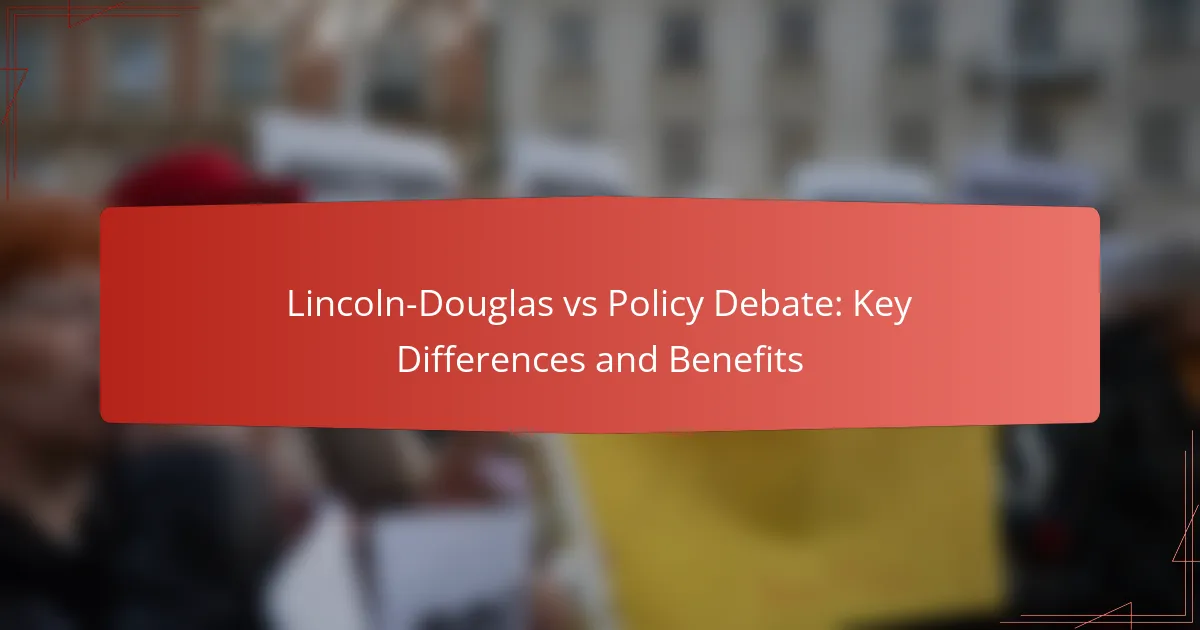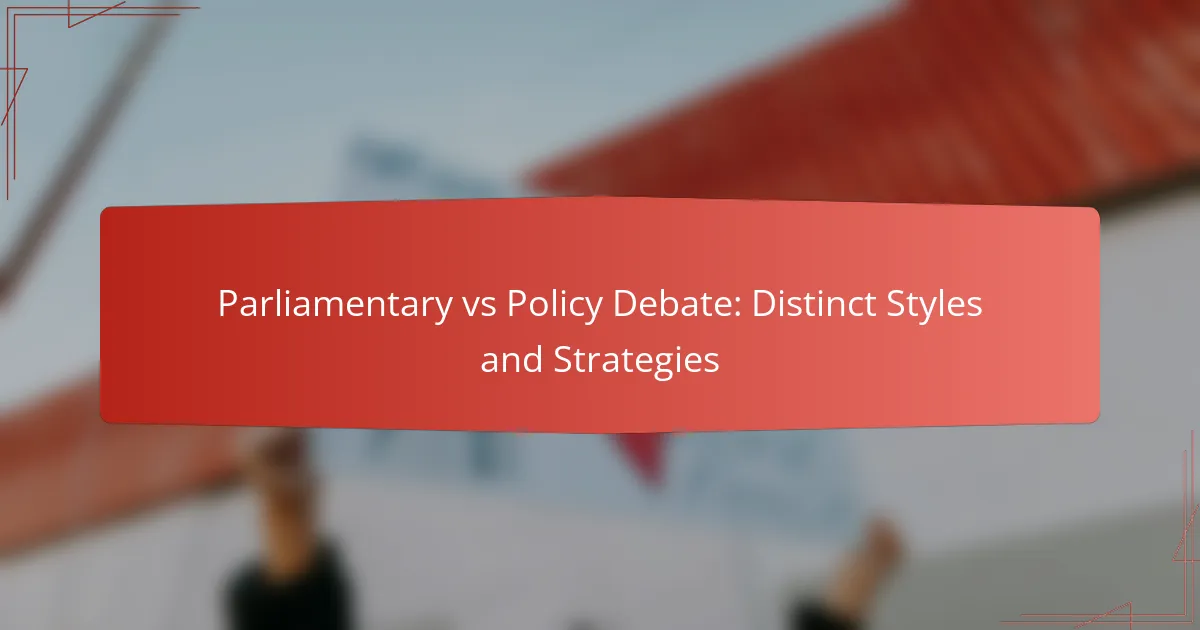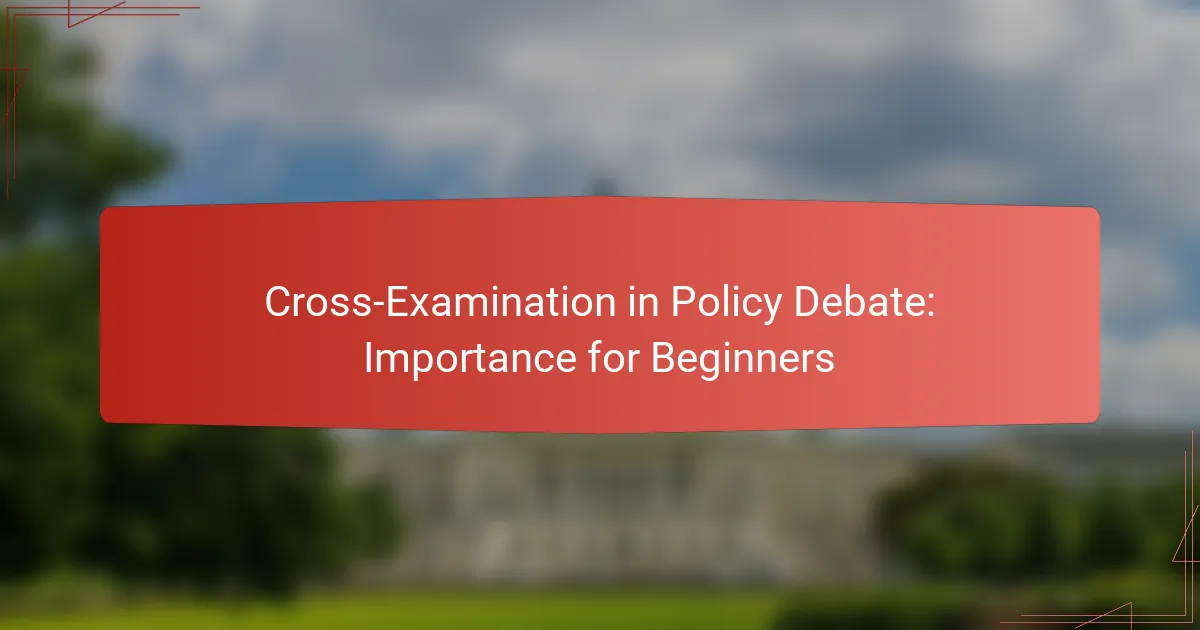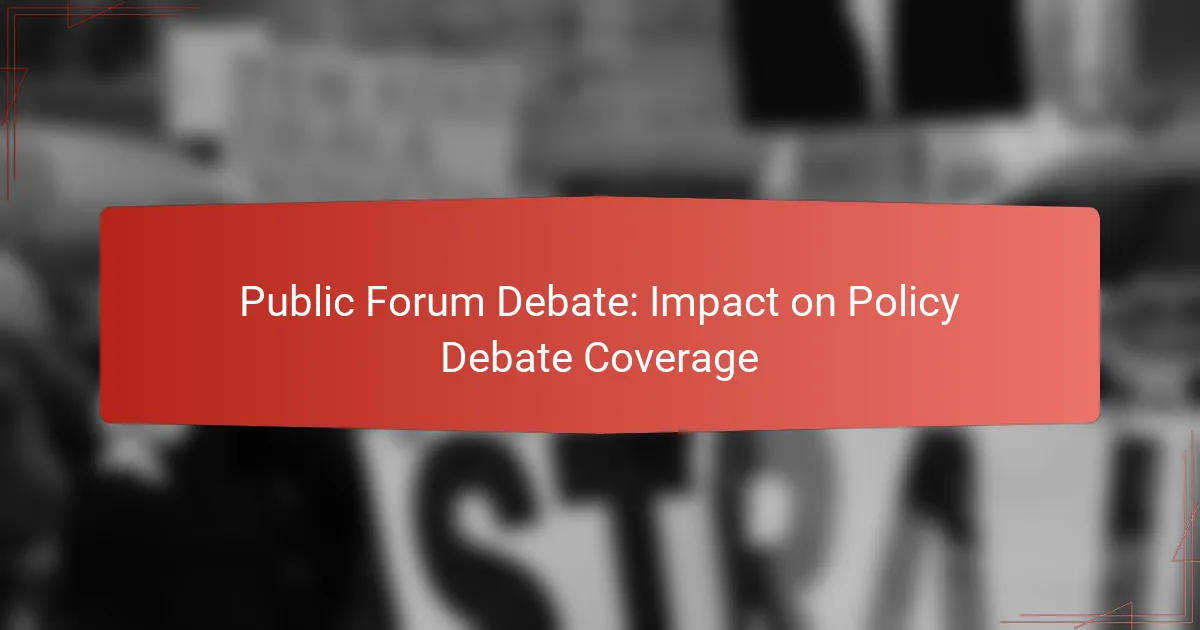Lincoln-Douglas and Policy Debate are two distinct formats that cater to different aspects of argumentative discourse. While Lincoln-Douglas emphasizes moral and philosophical issues through one-on-one debates, Policy Debate focuses on specific policy proposals and encourages team collaboration. Each format offers unique benefits, enhancing participants’ ethical reasoning or critical thinking skills, respectively.
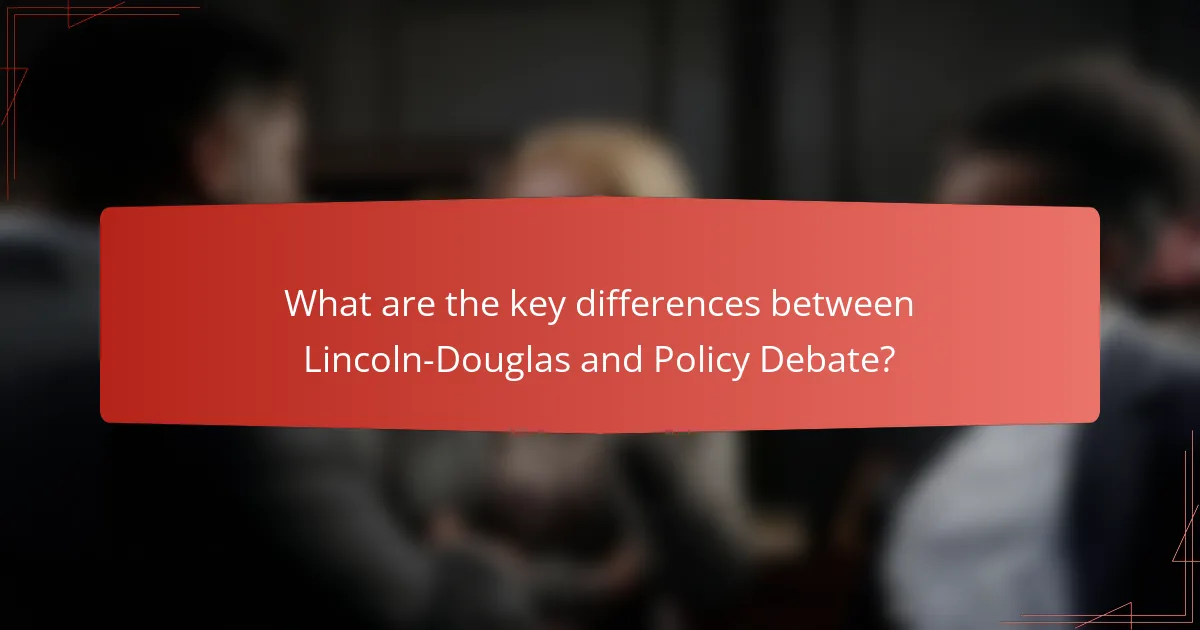
What are the key differences between Lincoln-Douglas and Policy Debate?
Lincoln-Douglas Debate focuses on moral and philosophical issues, while Policy Debate centers on specific policy proposals and their implications. Each format has distinct structures, judging criteria, and argument styles that cater to different aspects of debate.
Format variations
Lincoln-Douglas Debate typically involves two participants debating a resolution that addresses a value or ethical question. The format includes constructive speeches, rebuttals, and summary speeches, usually lasting around 40 minutes in total.
In contrast, Policy Debate features two teams of two participants each, focusing on a specific policy action. The rounds are longer, often exceeding an hour, with more complex structures that include cross-examinations and multiple constructive speeches.
Judging criteria
Judging in Lincoln-Douglas Debate emphasizes the clarity of moral reasoning, the strength of values presented, and the debaters’ ability to engage with philosophical concepts. Judges often look for persuasive delivery and the ability to connect arguments to real-world implications.
Policy Debate judging criteria prioritize the depth of research, the effectiveness of evidence, and the strategic use of arguments. Judges assess how well teams advocate for or against the proposed policy, focusing on the practical impacts and feasibility of the solutions presented.
Argument styles
In Lincoln-Douglas Debate, arguments are often framed around ethical dilemmas, using philosophical theories and moral principles. Debaters may employ value frameworks to guide their arguments, emphasizing the importance of ethical considerations in decision-making.
Policy Debate arguments tend to be more data-driven, relying on empirical evidence and case studies to support claims. Debaters frequently use a variety of argument types, including advantages, disadvantages, and counterplans, to create a comprehensive case for or against the policy in question.
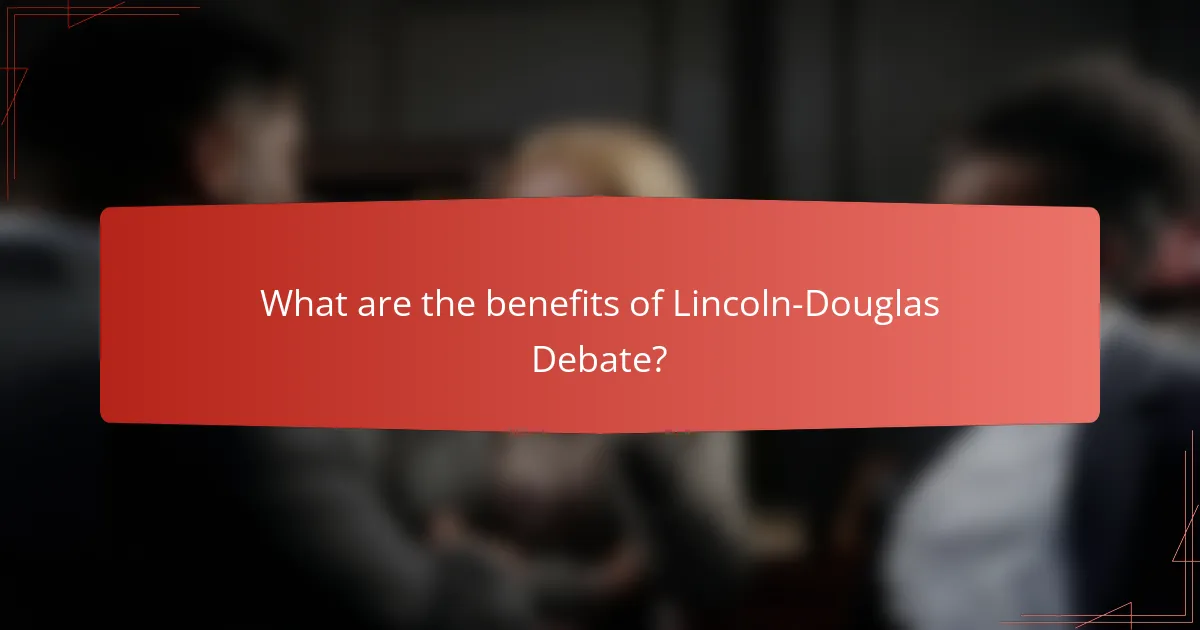
What are the benefits of Lincoln-Douglas Debate?
Lincoln-Douglas Debate offers several benefits, including a focus on ethical reasoning and the development of personal values. Participants engage in one-on-one debates that emphasize moral dilemmas, enhancing their ability to articulate and defend their beliefs.
Focus on values
Lincoln-Douglas Debate centers around philosophical and ethical issues, allowing debaters to explore and express their values. Topics often include justice, freedom, and morality, prompting participants to reflect on their beliefs and how they relate to societal norms.
This focus on values encourages debaters to not only argue their positions but also to understand opposing viewpoints. This can foster empathy and a deeper understanding of complex issues, which is essential for effective communication and civic engagement.
Development of critical thinking
Engaging in Lincoln-Douglas Debate cultivates critical thinking skills as participants must analyze arguments, identify logical fallacies, and construct coherent cases. This process sharpens their ability to evaluate information and make reasoned decisions.
Debaters learn to think on their feet, responding to opponents’ arguments with clarity and precision. This skill is invaluable in various aspects of life, from academic pursuits to professional environments, where critical analysis and effective argumentation are key.
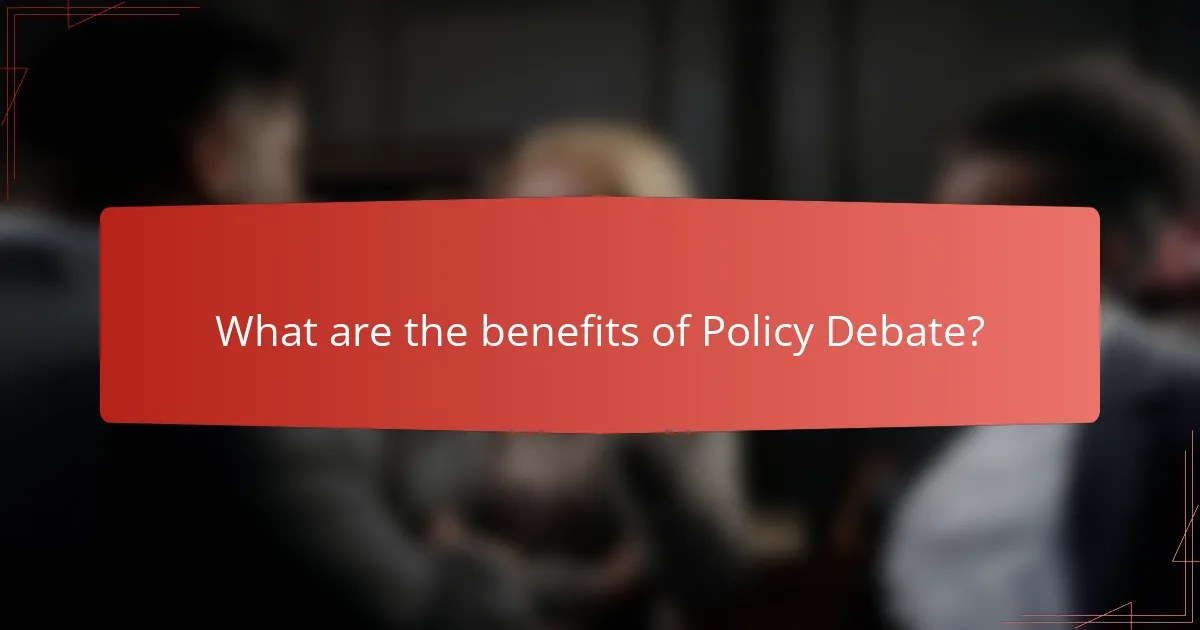
What are the benefits of Policy Debate?
Policy Debate offers several advantages, including a focus on in-depth research and the opportunity for team collaboration. These elements enhance critical thinking and communication skills, making it a valuable experience for participants.
Emphasis on research
In Policy Debate, participants are required to conduct extensive research on their assigned topics, often involving current events and policy issues. This emphasis on research helps debaters develop strong analytical skills and a deep understanding of complex subjects.
Debaters typically use a variety of sources, including academic journals, government reports, and expert opinions, to support their arguments. This rigorous approach ensures that they can effectively counter opposing viewpoints and present well-rounded cases.
Team collaboration
Policy Debate is inherently a team activity, where two members work together to construct arguments and strategies. This collaborative environment fosters communication skills and teamwork, as debaters must coordinate their efforts and support each other during rounds.
Effective collaboration can lead to better performance, as team members can leverage each other’s strengths and compensate for weaknesses. Regular practice sessions and strategy discussions are essential for building a cohesive team dynamic and enhancing overall effectiveness in debates.
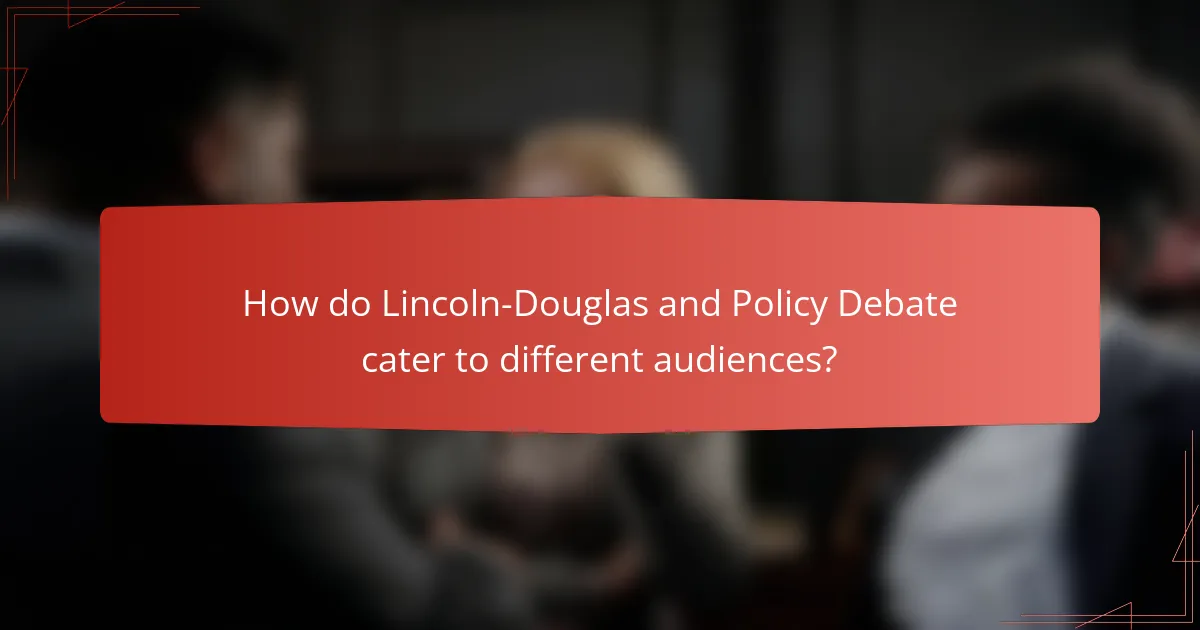
How do Lincoln-Douglas and Policy Debate cater to different audiences?
Lincoln-Douglas (LD) and Policy Debate serve distinct audiences by focusing on different aspects of argumentation and advocacy. LD emphasizes individual values and philosophical issues, while Policy Debate centers on specific policy proposals and their implications.
High school students
High school students often engage in Lincoln-Douglas Debate to explore ethical dilemmas and develop critical thinking skills. This format allows them to articulate personal beliefs and engage in moral reasoning, which is particularly appealing for those interested in philosophy or social issues.
In contrast, Policy Debate attracts students who prefer structured arguments and evidence-based discussions. It involves extensive research on current policies, making it suitable for those who enjoy analytical thinking and teamwork. Students typically focus on a specific resolution and must prepare for both affirmative and negative positions.
College-level competitors
At the college level, Lincoln-Douglas Debate continues to challenge competitors with complex ethical questions, appealing to those pursuing degrees in law, political science, or philosophy. The format encourages deep analysis and the ability to defend nuanced positions, which can enhance skills valuable in academic and professional settings.
Policy Debate in college often involves more rigorous research and a faster-paced environment. Competitors are expected to present detailed case studies and engage in rapid-fire rebuttals. This format is ideal for students looking to hone their public speaking and research skills while preparing for careers in advocacy, policy-making, or law.
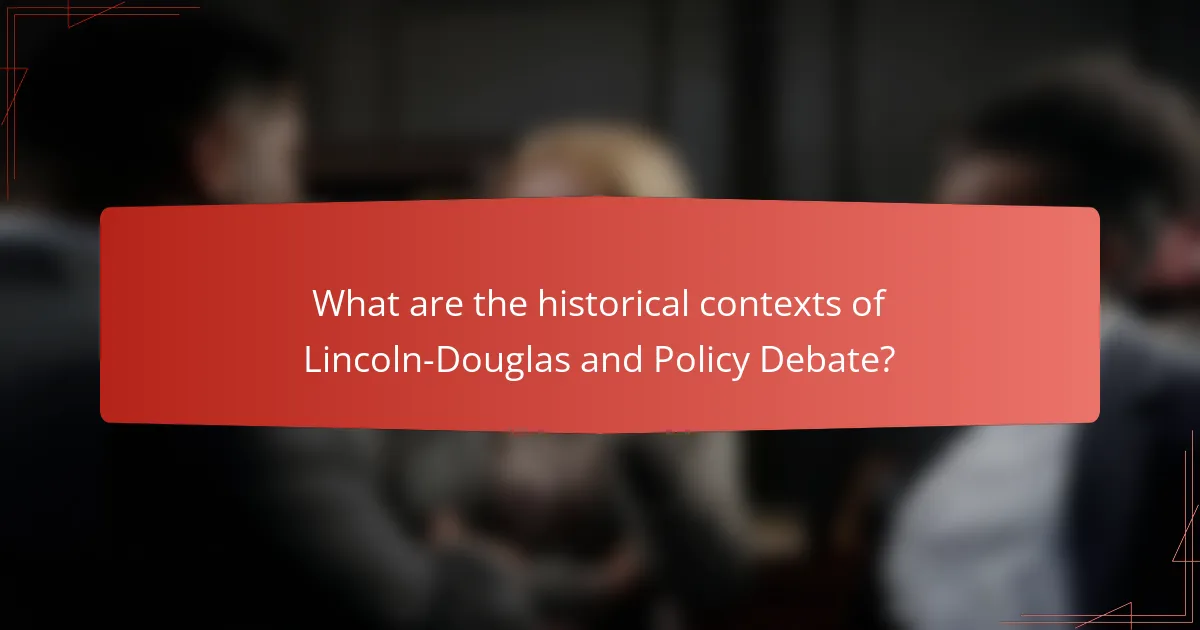
What are the historical contexts of Lincoln-Douglas and Policy Debate?
Lincoln-Douglas Debate originated in the mid-19th century, focusing on moral and philosophical issues, while Policy Debate emerged in the 20th century, emphasizing policy analysis and advocacy. Both formats have distinct historical roots that shape their current practices and educational benefits.
Origins of Lincoln-Douglas Debate
Lincoln-Douglas Debate traces its roots to the famous debates between Abraham Lincoln and Stephen A. Douglas in 1858, which centered on the issue of slavery. This format emphasizes values and ethics, encouraging debaters to engage with philosophical questions and moral dilemmas.
Typically, Lincoln-Douglas debates feature one-on-one competition, where participants argue for or against a resolution that often reflects contemporary ethical issues. The focus is on persuasive speaking and critical thinking, making it a popular choice for high school students interested in developing their rhetorical skills.
Development of Policy Debate
Policy Debate began to take shape in the early 20th century, evolving from earlier forms of debate that focused on public policy issues. This format is characterized by two teams of two debaters each, who advocate for or against a specific policy proposal, often involving government action.
In Policy Debate, the emphasis is on research, evidence, and strategic argumentation. Debaters must be well-versed in both the affirmative and negative cases, often using extensive evidence and case studies to support their arguments. This format is particularly suited for those interested in public speaking, critical analysis, and policy-making processes.
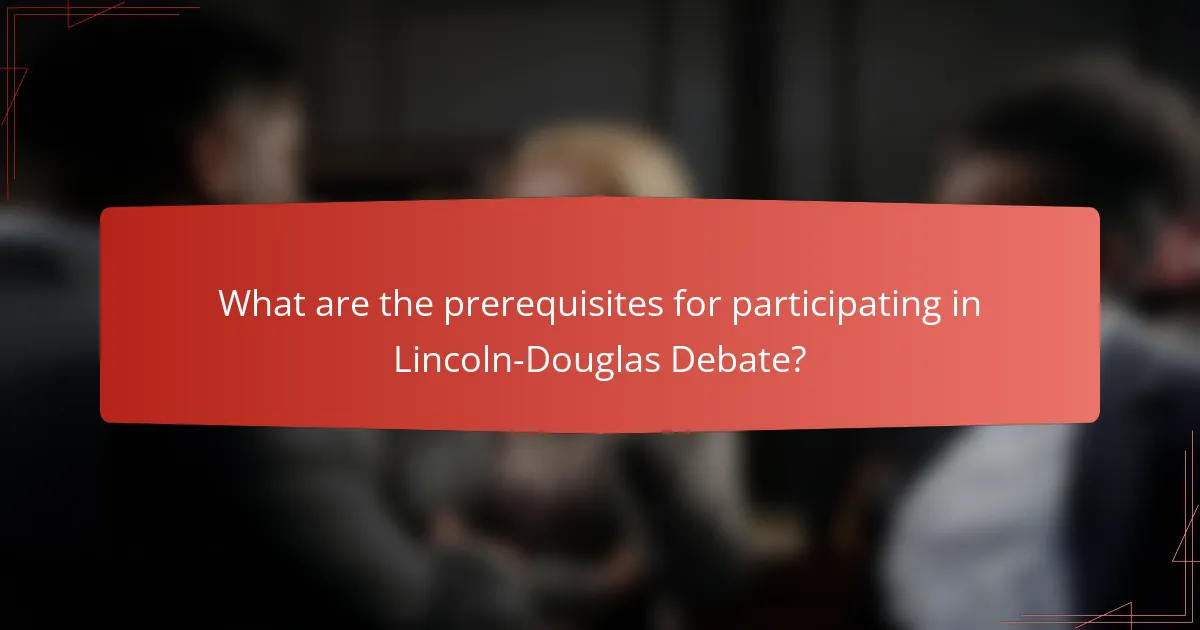
What are the prerequisites for participating in Lincoln-Douglas Debate?
To participate in Lincoln-Douglas Debate, individuals should have a solid understanding of philosophical concepts and the ability to construct ethical arguments. Familiarity with debate formats and critical thinking skills are also essential for effective participation.
Understanding of philosophical concepts
A strong grasp of philosophical concepts is crucial for Lincoln-Douglas Debate, as the format revolves around value-based arguments. Participants should be familiar with key philosophical theories, such as utilitarianism, deontology, and virtue ethics, which help frame their arguments and counterarguments.
Debaters often benefit from studying notable philosophers like John Stuart Mill and Immanuel Kant. Engaging with their works can deepen understanding and provide a foundation for constructing persuasive cases. Regularly discussing these concepts with peers can also enhance comprehension and application.
Preparation for ethical arguments
Effective preparation for ethical arguments involves researching various moral frameworks and practicing how to apply them in debates. Debaters should develop the ability to articulate their values clearly and defend them against opposing views.
Creating a list of potential ethical dilemmas and practicing responses can be beneficial. Additionally, reviewing past debates and analyzing successful arguments can provide insights into effective strategies. Participants should also be aware of common pitfalls, such as relying too heavily on emotional appeals instead of logical reasoning.
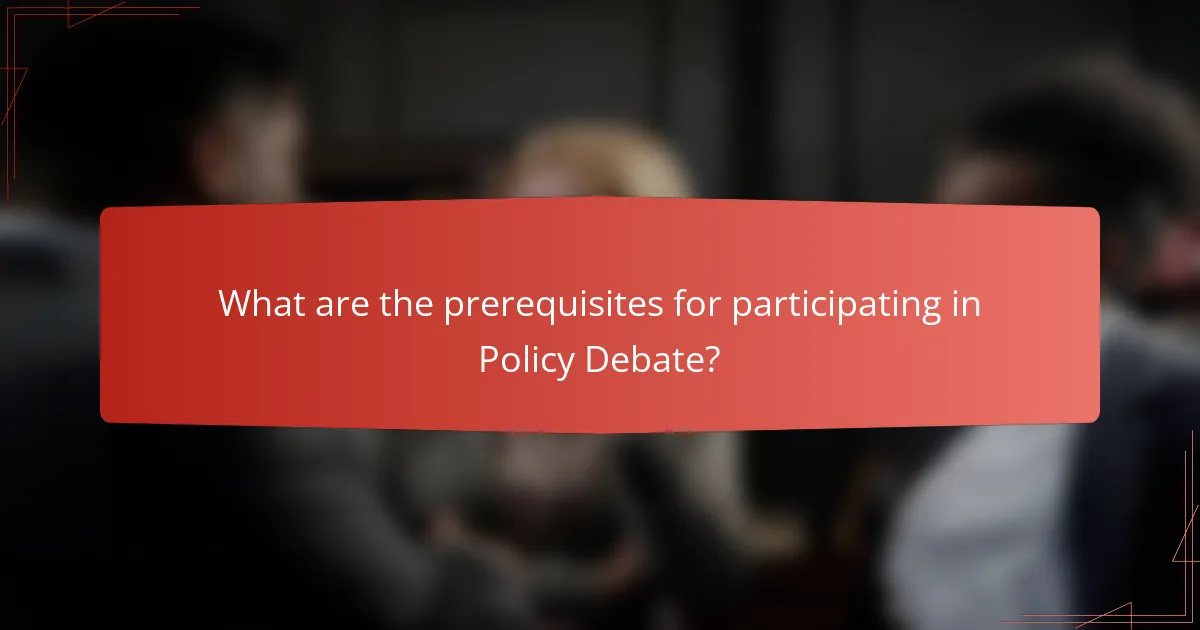
What are the prerequisites for participating in Policy Debate?
To participate in Policy Debate, individuals typically need a strong foundation in research, critical thinking, and public speaking. Familiarity with current events and policy issues is also essential, as debates often revolve around specific resolutions that require in-depth analysis.
Research skills
Effective research skills are crucial for Policy Debate participants, as they must gather and analyze a wide range of information on various topics. This includes understanding both sides of an issue, evaluating sources for credibility, and synthesizing data to support arguments. A good starting point is to focus on reputable academic journals, government publications, and established news outlets.
Debaters should aim to create a well-organized database of evidence, including statistics, expert opinions, and case studies. Using tools like spreadsheets can help track sources and key points efficiently. Regularly updating this database ensures that participants remain informed about the latest developments in their chosen topics.
Ability to construct policy proposals
Constructing effective policy proposals is a fundamental skill in Policy Debate, as debaters must advocate for specific solutions to problems. This involves outlining clear, actionable steps that address the resolution while considering potential impacts and feasibility. A strong proposal typically includes a problem statement, proposed solution, implementation strategy, and anticipated outcomes.
When drafting policy proposals, participants should consider the practicality of their solutions. Engaging with real-world examples can strengthen arguments, demonstrating how similar policies have succeeded or failed in the past. Additionally, debaters should be prepared to defend their proposals against counterarguments, highlighting the benefits and addressing potential drawbacks.
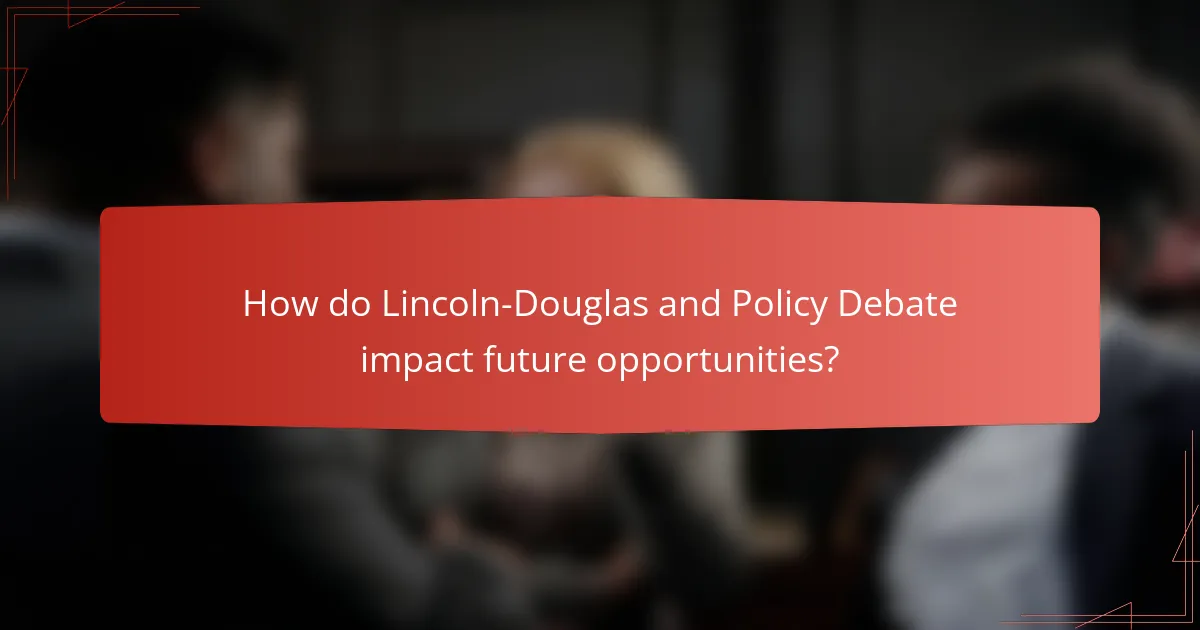
How do Lincoln-Douglas and Policy Debate impact future opportunities?
Lincoln-Douglas and Policy Debate each offer unique benefits that can significantly influence future opportunities for participants. While Lincoln-Douglas focuses on values and ethics, Policy Debate emphasizes policy analysis and implementation, shaping skills applicable in various fields.
Skills Development
Both Lincoln-Douglas and Policy Debate cultivate essential skills, but they do so in different ways. Lincoln-Douglas enhances critical thinking and ethical reasoning, which are valuable in professions such as law and education. In contrast, Policy Debate develops research, analytical, and persuasive skills, making it advantageous for careers in public policy, government, and advocacy.
Participants in Lincoln-Douglas often learn to articulate complex moral arguments succinctly, while Policy Debaters gain experience in constructing comprehensive policy proposals. This diversity in skill sets can open doors in various industries.
Networking Opportunities
Engaging in either debate format can lead to valuable networking opportunities. Lincoln-Douglas tournaments often attract educators and professionals in law and ethics, providing a platform for participants to connect with mentors and peers in those fields. Policy Debate, on the other hand, tends to draw individuals involved in politics and public policy, fostering connections that can lead to internships and job offers.
Building relationships through debate can enhance career prospects, as many professionals value the communication and analytical skills honed through competitive debating.
College Admissions
Participation in either Lincoln-Douglas or Policy Debate can positively impact college admissions. Admissions committees often look for candidates who demonstrate strong critical thinking, effective communication, and a commitment to civic engagement. Both debate formats showcase these qualities, making applicants more appealing to universities.
Moreover, students who excel in debate may receive scholarships or special consideration in competitive programs, particularly in fields related to law, political science, and communication.
